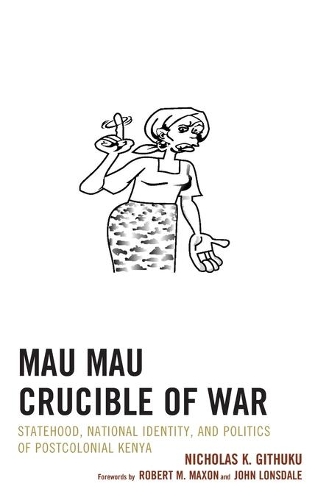
Mau Mau Crucible of War: Statehood, National Identity, and Politics of Postcolonial Kenya
(Hardback)
Publishing Details
Mau Mau Crucible of War: Statehood, National Identity, and Politics of Postcolonial Kenya
By (Author) Nicholas K. Githuku
Foreword by Robert M. Maxon
Foreword by John Lonsdale
Bloomsbury Publishing PLC
Lexington Books
9th December 2015
United States
Classifications
Professional and Scholarly
Non Fiction
Social and cultural history
Nationalism and nationalist ideologies and movements
Peace studies and conflict resolution
967.603
Physical Properties
Hardback
574
Width 157mm, Height 239mm, Spine 39mm
934g
Description
Mau Mau Crucible of War is a study of the social and cultural history of the mentalit of struggle in Kenya, which reached a high water mark during the Mau Mau war of the 1950s, but which continues to resonate in Kenya today in the ongoing demand for a decent standard of living and social justice for all. This work catalyzes intellectual debate in various disciplines regarding not just the evolution of the Kenyan state, but also, the state in Africa. It not only engages historians of colonial and postcolonial economic and political history, but also sociologists, anthropologists, political scientists, and those who study personality and social branches of psychology, postcolonialism and postmodernity, social movements, armed conflict specialists, and conflict resolution analysts.
Reviews
[T]here is much to be admired in this ambitious and unconventional approach. Githuku provides a richly detailed and passionately argued study that will be of interest to anyone who seeks to understand the making of the postcolonial state in Kenya and the continuing tensions and disaffections that lurk just beneath the surface of its modern political life. * The International Journal Of African Studies *
[This book] offers prospective readers a richly detailed analysis of the ways in which unresolved historical problems and injustices stemming from colonialism continue to haunt contemporary Kenya. * African Affairs *
Nicholas Githukus history confronts [Kenyas] violence and its political effects head on. He asks new questions about Kenyas history, quotes previously unexamined evidence, and offers his readers important new insights. In all this he challenges his fellow Kenyans to join him in resurrecting their local historiography. -- John Lonsdale, Trinity College, Cambridge
To those who contend that the history of the colonial period is no longer of much consequence in recent developments and trends in Kenya and other parts of Africa, moreover, this book provides a detailed and powerful refutation. -- Robert M. Maxon, West Virginia University
Author Bio
Nicholas Kariuki Githuku is assistant professor of African history at York College, CUNY.
